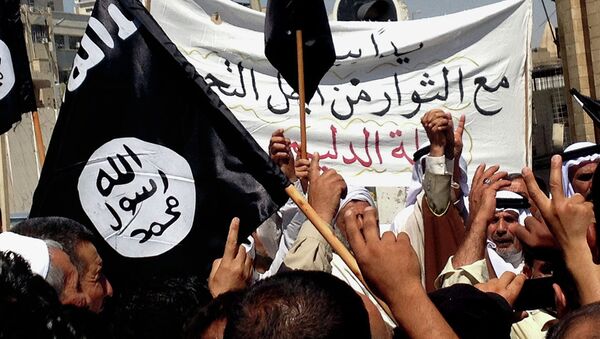While the columnist does not entirely challenge conventional Western media wisdom, which blames Russia for the civil war in eastern Ukraine stemming from last year's Maidan coup, he recognizes that the solution to the conflict can be found "only within the framework of the realization on the part of Washington and Moscow that radical Islam is the main danger threatening the United States, Russia, and Europe." With this in mind, he proposes that the "formerly rejected option" of the federalization of Ukraine may be the "mutually acceptable solution" necessary in order for the two nations to focus on the much greater threat.
Absent agreement between the two countries, the analyst warns that "for the adherents of the growing theocratic-totalitarian ideology, there is no bigger chance to turn into reality their dreams for global domination than the growing hostility between America and Russia, or ideally, a war between those countries."
The Results of the US Failure to Strangle ISIL in Its Infancy
He notes that while both the Russia and the US supported 'their side' in Syria, there was "one critically important difference between the choices made by Vladimir Putin and Barack Obama." In the columnist's view, Putin's strategy was "based on the consideration to preserve the secular regime of Syrian President Bashar Assad from the assault of different Islamic groups and organizations whose purpose was the establishment of an Islamic state on the territory of the country." By contrast, Obama's strategy, informed by then-Secretary of State Hillary Clinton and influenced by Turkey, was to ignore or even tacitly support radical Islamists in their mission to topple Assad.
Furthermore, Gounev notes that "as far as the Syrian Civil War was concerned, the Obama administration missed a wonderful opportunity to wipe out ISIL from the very beginning with a massive air attack originating from US aircraft carriers while the Jihadists were on their way to Mosul (Iraq). Instead, Mr. Obama referred to ISIL as the 'Junior Varsity team.'"
The columnist states with a guarded sense of optimism that today, "at least some Washington policymakers realize that the problem with US policy in the Middle East is not the lack of strategy but the wrong strategy. The hope is that there is an increasing number of people who realize that so far the United States have been assisting the wrong side [in] the Syrian conflict."
Gounev believes that along with ISIL, the other radical Islamist danger threatening to careen out of control and to affect the security of both Russia and the United States is the conflict in Afghanistan. Warning of the "almost inevitable Taliban victory in Afghanistan after the US withdrawal," the columnist states that what emerges will be "a development very similar to the one that took place in Syria and Iraq." In such a situation, he explains that "the Taliban's tentacles will spread into former Soviet Central Asia and into the barely accessible areas of Pakistan," with the Islamists using "this huge territory as a base" to increase "drug trafficking" and to otherwise destabilize both Russia and the US, the latter presumably via threats to allies and/or the heightened danger of terror attacks.
In this situation, the Gounev concludes that Moscow and Washington must resolve their differences, including over Ukraine, in order to challenge the growing global threat stemming from radical Islam, not only in Syria and Iraq, but worldwide.



